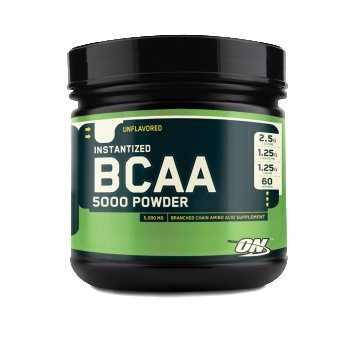Amino acids are the building blocks from which proteins are built. BCAA (Branched Chain Amino Acids) are so named because of their structure, which has a “side chain” of one carbon atom and three hydrogen atoms attached to it. Branched chain amino acids include three amino acids: leucine, isoleucine and valine. Of these, leucine is the best studied. It is this that has the most powerful physiological effect in the body. You will learn more about this, as well as how to properly use BCAA for maximum effect, in this article.
BCAAs are essential for protein synthesis and energy production, and can make up up to one-third of muscle protein by weight. Due to their importance in protein synthesis and energy production, bcaa are essential substances for the body.
However, in order for amino acids to participate in processes occurring in the body, they must be obtained from somewhere. This means that we should consume enough of them, and at the right time, so that these processes do not stop.
Why is it so important to get enough BCAA's?
BCAA are the only amino acids that are not broken down in the liver. All other amino acids are regulated in the intestines before entering the body. But the drugs go straight into the bloodstream. This means that their consumption directly affects its levels in the blood and muscle tissue. What's also interesting is that BCAAs can be oxidized to provide energy during exercise, so they can also be considered an important fuel for exercise.
Consuming bcaa before exercise can increase the amount of the substance that ends up in muscle tissue. This has many benefits, such as reducing the amount of lactic acid produced during strenuous exercise. This will improve the rate of oxidation in the muscles.
They can also improve the circulation of growth hormone in the body. Growth hormone is an anabolic hormone that causes muscle growth.
BCAAs play their most important role in muscles. Their concentration is higher in muscle cells. That's where she does her work. Bcaa is continuously released from the liver and other organs and redirected to the skeletal muscles to help normalize blood sugar levels. In addition, they may be responsible for producing 40% of the sugar released into the blood during exercise.
Due to the importance of amino acids for muscle tissue and blood sugar production, it is important to get enough of them for an effective workout. Consuming a shake that is high in carbohydrates, protein, and amino acids will trigger an insulin response that will help transport BCAAs into muscle cells. However, leucine is more important than insulin. There is one regulatory receptor in muscle cells that, when stimulated by insulin, triggers protein synthesis. But it also depends on leucine. In other words, protein synthesis (and therefore the rate of muscle regeneration) depends on how much free leucine is available. BCAA levels decrease during exercise, making supplementation with them very important during exercise.
In order for the body to synthesize new proteins, you need to consume 1 to 4 grams of leucine per day every day. This has been confirmed by the World Health Organization. This minimum amount must be consumed for leucine to begin interacting with insulin receptors. But this is just the minimum. In fact, if you are an athlete or bodybuilder doing heavy lifting, you should take about 12 grams per day.
BCAA content in different protein sources (per 100 g of product):
Benefit for health
The composition of BCAA amino acids has a positive effect on the human body. The benefits are as follows:
- participate in the construction of muscle tissue;
- prevent the breakdown of muscle fibers. Such unpleasant consequences are often encountered by bodybuilders who are on low-calorie diets;
- normalize insulin production in the body, maintaining normal glucose levels, which saturates muscles with energy;
- increase the level of cortisol and testosterone, maintaining their required level in the blood;
- prevent the breakdown of proteins;
- have a positive effect on the metabolism of cells that did not receive enough oxygen. This type of amino acid is useful for people with ischemia;
- accelerate the process of burning fat cells.
The range of BCAAs is quite wide. They are sold in different flavors of berries, apples, and bananas. Pleasant flavors perfectly reduce the need for chocolate and sweets. This is very important for those who want to lose weight.
BCAA: building blocks of muscles

Branched chain amino acids are almost the most effective and beneficial supplement in sports nutrition.
Proteins are built from amino acids. And without proteins, muscles cannot grow.
Branched-chain amino acids are a special group of amino acids, and of all workout enhancement supplements, they are one of the best. Benefits include reduced fatigue, faster recovery, increased levels of other amino acids, and better protein absorption. An insufficient amount of them causes loss of muscle mass.
Here's a more detailed look at how these substances work and reasons to take BCAA supplements.
Amino acids
Amino acids are organic compounds whose molecules simultaneously contain carboxyl and amine groups.
Amino acids perform different roles in the body:
Amino acids are also needed to build muscles, red blood cells and hundreds of other molecules. The human body cannot produce nine of these amino acids, so they must be obtained from food or supplements. A person can get these amino acids by consuming proteins or taking supplements.
These nine amino acids that the body cannot produce itself are called essential. These include:
Essential amino acids:
The branched chain group includes three essential amino acids:
BCAAs also differ from other amino acids in that they do not pass through the liver and are used in the muscles.
What are amino acids?
In the most general sense, protein for muscle tissue is a building material. Bcaa amino acids also play a critical role in physiological processes related to strength, muscle gain, brain function, well-being, energy and recovery. But that's not all. They are also important for weight loss, especially when there is a need to burn fat and maintain muscle.
Any protein, aka protein, consists of a set of amino acids (the type of protein depends on which amino acid chains are present in it) and many natural products with a high protein content. It is common to think that any protein source consists of essentially the same thing, but this is not true. For example, the elements in meat, yogurt, chicken, crumbly cottage cheese, fish and other products differ from each other. This is because each of these protein sources has a different type and amount of amino acids. And they, in turn, play a vital role in restoring the body and creating new muscle tissue.
There are 2 types of amino acids:
- replaceable;
- irreplaceable.
The body can produce nonessential amino acids independently from other amino acids. They are responsible for many functions: removing toxins, helping with proper brain function, synthesizing blood cells, providing the body with antioxidants, strengthening the immune system, and regulating energy levels. These include: arginine, glutamic acid, glycine, aspartic acid, histidine, serine, cysteine, tyrosine, alanine, proline. Without the right levels of amino acids, you get sick easily, feel sluggish, and suffer from a variety of other side effects.
The body is not able to synthesize essential amino acids on its own; they must come from outside along with protein foods. These include: valine, methionine, leucine, isoleucine, phenylalanine, lysine, tryptophan, threonine.
Especially when you train intensely, your body needs additional protein with a complete amino acid composition.

Roles of BCAA
BCAA have many functions in the body:
Protein synthesis
BCAAs can speed up protein synthesis in muscles. This makes them both an anabolic (muscle-building) and anti-catabolic (protecting muscles from damage) supplement. But how exactly does this happen?
Muscle protein synthesis occurs when amino acids combine to create muscle tissue.
This constant movement of protein in the body and the accelerated oxidation of leucine for energy means that leucine is in demand during exercise. Therefore, if there is not enough of it, it may not help you gain weight.
As you probably already know, muscle tissue is made of protein. And protein is made of amino acids, which are connected like beads on a string. Thus, you can see that muscle is built from amino acids, which are combined into proteins. This is called muscle protein synthesis. Although leucine, valine and isoleucine are important elements in building muscle, their role is much more important than the simple “blocks” from which proteins are built.
Research has shown that beta, and leucine in particular, stimulates muscle growth by directly stimulating the muscle protein synthesis machinery. Leucine works as a key to start the synthesis process, during which amino acids combine and build muscle protein. In addition, leucine increases the amount of insulin in the blood. Insulin can also be considered an anabolic hormone because it speeds up the protein building process. Protein synthesis stimulates the release of insulin, which allows muscle cells to take sugar from the blood and use it as energy. Insulin also causes muscle cells to take amino acids from the blood.

Another hormone affected by BCAAs is cortisol. Research has shown that athletes who took amino acid supplements had lower blood levels of the hormone cortisol during exercise. Reducing the release of cortisol allows you to further speed up protein synthesis because cortisol stimulates muscle breakdown and interferes with the hormone testosterone. Athletes taking this supplement lose almost no muscle mass after exercise and recover faster after training. This anti-catabolic effect reduces post-workout pain.
Energy production
Amino acids are marketed as glucogenic, ketogenic, or a combination of the two. Glucogenic amino acid can be used to produce glucose using gluconeogenesis. And the ketogenic amino acid creates acetyl, which is a precursor to many fatty acids.
Leucine is fully ketogenic, valine is fully glucogenic, and isoleucine has both qualities. Valine and isoleucine can be used to produce glucose.
Leucine is especially powerful in terms of energy production. It can provide high amounts of ATP to skeletal muscles. ATP is a molecule that transfers energy to cells that contract in muscles (and ATP also performs many other functions).
To meet the increased energy demands that occur during exercise, the body begins to break down muscle tissue to produce BCAAs. But if you took a bca supplement before the exercise, you can cover these requirements without breaking down muscle to do so. This will allow you to do an intense workout without losing weight.
Creation of Alanine and Glutamine
The human body also needs alanine and glutamine during exercise. Again, muscle fibers are destroyed to produce them. And the destruction of muscle fibers leads to mass loss, which no athlete can afford. By adding BCAA supplements to your food, you can provide the body with the material to produce alanine and glutamine from the outside.
Intense weight training produces a severe catabolic response. Glycogen reserves are depleted quickly, and the liver has to compensate by synthesizing glucose and L-alanine for energy. Supplements can help you maintain the right amount of alanine.
Also, drinks enriched with these supplements can help the body create the amino acid glutamine directly inside skeletal muscles. Glutamine levels within muscles control protein synthesis and nitrogen balance. This is what drives muscle mass gain.
Glutamine adds volume well, expanding cells. An increase in cell volume stimulates anabolism and stops catabolism. In addition, glutamine transports nitrogen between organs and provides energy to cells of the immune and digestive systems.
Leptin regulation
Consuming leucine supplements stimulates the release of the hormone leptin. Leptin is associated with the regulation of metabolism, weight and appetite.
The release of leptin in the body is related to the body's fat content. The more leptin is released, the more fat the body stores. If you follow a low-calorie diet, the amount of leptin drops, which causes obsessive thoughts about food - because the body is trying to regain the amount of fat. He now has a certain level.
And leucine has the same effects as leptin, tricking your body into thinking you just ate and are getting enough calories. This will relieve you of hunger and speed up your metabolism.
Why take BCAA supplements?
Helps fight fatigue

BCAAs can travel in the blood, reaching the brain and delaying the release of serotonin in the brain, thereby stopping the development of fatigue that serotonin causes. Therefore, a bca supplement can help you become more alert so you can work harder.
During exercise, the hormone serotonin (or 5-HT) signals your brain, telling it that your body is tired. This leads to a decrease in the efficiency of your muscles - reduced strength and endurance. The amino acid tryptophan is responsible for producing 5-HT in the brain, but BCAAs, namely valine, compete with tryptophan to get to the brain first. Research shows that taking amino acids before exercise reduces the amount of tryptophan that reaches the brain. This results in a delay in fatigue. Thus, BCAAs can help you a lot during a long workout.
This ability to prevent fatigue and drowsiness also means that BCAA supplements don't just help muscles. They are also good for the brain.
This is another reason why athletes who value endurance or intense exercise take the supplement: they need to continue to maintain concentration despite fatigue. Some people take BCAA's at work for the same reason.
The body uses BCAA differently than many other substances. Typically, when you consume amino acids, either alone or as proteins, they are first sent to the liver. And the liver breaks them down to produce energy. Or uses them to repair damage to muscles or other tissues. Bca, on the other hand, does not pass through the liver, and goes directly to the muscles, so the muscles can almost instantly use them for energy or repair.
This makes these supplements more relevant during training. During exercise, they can be used as a source of energy, and after exercise as a material for muscle recovery. This explains why the supplement packaging states that it should be taken both before and after exercise, and sometimes during it.
The effect may not be as great as a pre-workout supplement, but many people who try the supplement for the first time claim that the amino acids make working out a much more enjoyable experience.
However, if you feel tired all the time, overtraining could be the cause. When was the last time you took a vacation? Make sure you get enough rest and quality food to allow you to train effectively, especially if you're exercising on an empty stomach or cutting back on carbs.
BCAA helps you lose fat

BCAAs clearly help people gain muscle mass, but they also help people lose excess fat. The researchers aren't yet sure how exactly this happens, but they have proposed several theories to explain these unexpected results.
One of the first studies to find this was a comparison of wrestlers in 1997, which found that those who took BCAA supplements while following a low-calorie diet lost fat faster, especially that stored around the belly, than those who took a placebo.
Another study conducted in 2009 also found that lifters who took BCAA's lost twice as much body fat as those who only took whey protein.
And a study in Brazil found that leucine supplements taken for six weeks caused a dramatic reduction in body fat. Researchers suggest that this is due to accelerated protein synthesis, which is stimulated by leucine. Synthesis requires so much energy that fat begins to burn. Leucine also helps fight hunger by allowing you to eat less and burn more calories, which obviously causes fat loss.
And the newest information comes from research in Japan. The scientists found that mice that were given isoleucine supplements along with a high-fat diet gained much less weight than mice that were not given isoleucine. This is due to isoleucine's ability to activate special receptors known as PPARs, which speed up the breakdown of fat and stop it being stored.
Reduce catabolism
BCAAs are effective against catabolism because they stop protein breakdown and muscle loss, which is especially important for those on a low-calorie diet.
BCAAs are highly recommended during a diet because the risk of losing muscle mass is increased, because the rate of protein regeneration decreases, and the rate at which the body breaks them down increases. The process of protein breakdown is similar to digestion - proteins break down into individual peptides and amino acids.
What are the benefits of these amino acids?

The benefits of branched chain amino acids are not limited to the world of health and fitness, they are important in many different aspects of life beyond active sports. They are used to treat certain brain diseases, Lou Gehrig's disease, kidney disorders, and are prescribed for cancer patients, the elderly, and those who must endure bed rest. However, their functions are far from limited to caring for the sick and elderly.
Do not misunderstand me. Why do healthy people take BCAA? They use them to enhance concentration and combat fatigue. Athletes also use them. How? BCAAs reduce the chance of muscle tearing and improve athletic performance.
Exercise increases serotonin levels. This is associated with the onset of fatigue. This is where taking BCAA comes into play. Why? They are believed to be able to reduce serotonin levels. As a result, it removes the fatigue factor and improves athletic performance. Many researchers share this opinion. There are, however, works that tend to refute this. They suggest that the influence of BCAA is overestimated and amino acids of this kind are useless.
So who to believe? What are the benefits and harms of BCAA?
Let's take a look at the facts. BCAAs are processed primarily in skeletal muscles. Other amino acids are processed by the liver. As a result, some people believe that they should take BCAAs during exercise. Of course, this supplement is often promoted as a means to reduce muscle pain, repair muscles, and improve speed and strength performance. There is evidence to support the view that what BCAAs do before and after workouts is to have a positive effect on broken down muscle tissue and increase protein synthesis to build muscle mass.
People take essential amino acids because they can enhance protein synthesis, which in turn will affect muscle growth over time. They are also used to reduce fatigue during training for both beginners and experienced athletes. The amino acid leucine is very important for muscle protein synthesis. Isoleucine is responsible for the absorption of glucose into cells. Research is still underway to determine valine's place among BCAA supplements.
In addition, a decrease in the amount of these substances causes an influx of tryptophan into the brain. And this causes the production of serotonin, which, as I mentioned, in turn makes you feel tired.
BCAA in proteins
One question many people ask is should you take bza while on a balanced diet that already contains a lot of protein? Although BCAAs are found in many protein foods, supplementing with them still has specific benefits.
Even such an easily digestible protein as whey cannot quickly deliver amino acids to the muscles. The addition of pure amino acids is much more effective in this case. Once purified, they almost instantly enter the bloodstream. Although whey protein is rapidly absorbed, the metabolic response will be different.
When whey protein reaches the intestines, it will take 4 minutes to digest before the amino acids are available to the body. If you were relying on protein, you most likely won't notice its effects in time.
In other words, although you get BCAA from protein, you get it much faster from a supplement than from food, making it much more effective for your workout.
Contraindications
Before use, consultation with a doctor is required. BCAA amino acids are prohibited if there are allergic reactions to them. Other contraindications:
- Increased acidity of gastric juice, peptic ulcer, gastritis, duodenitis.
- Diabetes.
- Severe concomitant pathologies of the heart, bile ducts, liver and kidneys.
If BCAA amino acids are used irrationally, they can cause harm to the body. There is an increased risk of injury, and sometimes dyspeptic symptoms occur (nausea, heartburn, flatulence, stool disorders).
Scientific Research on BCAA
BCAAs are often recommended because their beneficial effects are supported by scientific research. Here are just a few examples.
In a study conducted on endurance athletes, it was found that these supplements actually slowed muscle breakdown. Other studies have shown that even after strength training, catabolism continues for 4 to 14 hours, after which muscle growth begins. If anabolism lasts longer than catabolism, the result is an increase in both mass and strength. Therefore, an amino acid supplement will be very useful after training.
The second study compared blood amino acid levels in ten men who were divided into three groups. After training, one group took pure amino acids, the second received protein (cottage cheese), and the third received both.
After fifteen minutes, participants taking amino acids alone had high levels of amino acids in their blood, much higher than other participants. And contrary to the researchers' fears, the kidneys did not remove them from the blood. This proves that taking BCAA may be more beneficial than taking protein, even in small amounts.
BCAA dosage: how much powder and when should you take it?

The best time to take BCAA is during exercise. You should add 5-10 grams to your shake, both after and before training, since this type of amino acid provides energy to both the muscles and the body as a whole.
If your diet doesn't include protein supplements, BCAA, which gives your body all the benefits of amino acids, can provide a lot of benefits to your muscles. It literally accelerates muscle growth and increases mass.
In other words, you can sometimes eat less protein than you need and still get all the benefits of high-quality protein. Plus, you minimize the harmful catabolic effects (muscle breakdown) that are caused by high protein intake.
Taking the supplement before and during your workout will give you a burst of energy and create the conditions for muscle growth. Quick energy is especially needed for those on a low-carb diet, because it is from carbohydrates that the body gets energy.
Try making a shake that contains 25 grams of carbohydrates, 10 grams of whey protein and 5-7 grams of bcaa. Drink it as soon as you finish your workout. Your next meal should cover all your body's needs, but getting quick energy with this shake should greatly help your body by stopping catabolism and increasing the effects of your workout.
While you can only take one amino acid to gain specific benefits, it is far more beneficial to take all three in the correct ratio. You can get more benefits from fewer BCAAs.
In addition, researchers found that 4.2 grams of leucine, when added to a shake that does not contain much protein (about 10 grams), greatly increases the anabolic effects of that shake during heavy exercise. The effect was observed in both young and elderly people.
If your goal is to gain muscle mass, then also try taking BCAAs as soon as you wake up to stop the muscle breakdown that begins in the morning due to overnight fasting. You can take 5-10 grams of amino acids at any other time of the day to gain mental strength or reduce hunger. If you get little protein from food, then taking bza is simply necessary.
But if you don't want to think about time, you can just add them to a shake or just water and drink them twice a day. Unlike many drugs, BCAA can be taken on an empty stomach. On the contrary, if you haven't eaten for a long time, they will give you a big boost of energy. Plus, they often taste good, allowing you to drink enough throughout the day.
What types of food contain the most BCAA?

BCAAs have been a necessary part of the human diet long before they were taken with supplements. Branched chain amino acid supplements are very popular for their ability to increase protein synthesis during and after exercise. In addition, they allow you to conveniently increase the leucine content in your muscles, without the need to eat anything. However, with the advent of supplement popularity, the importance of dietary sources of these amino acids has faded into the background.
Chewing and swallowing food that contains essential amino acids is much more difficult than mixing powder with water and drinking. But on the other hand, you can’t always get by with supplements alone. Products, real food, always contain many other beneficial substances besides BCAA, which is why it is so important to include them in the diet.
If you're trying to get the most out of your diet to build stronger muscles and recover faster from workouts, check out these statistics on the amino acid content of some popular protein sources.
This table shows interesting information about the amino acid composition of food. For example, turkey breast provides more protein than any other source (not counting eggs, which are measured differently altogether). But turkey contains the least amount of BCAA. For comparison, dry roasted peanuts contain much more leucine, and other bcaas, than any other source, even meat. But peanuts have much less protein.
Table of BCAA content in products
| Products | A portion | Protein | BCAAs | Leucine | Isoleucine | Valin | BCAA per 1 gram | Leucine per 1 gram |
| Chicken breast | 180 g | 36 g | 6.6 g | 2.6 g | 1.8 G | 1.9 g | 0,18 | 0,8 |
| Lean beef | 180 g | 36 g | 6.2 g | 2.8 g | 1.6 G | 1.8 g | 0,17 | 0,8 |
| Tuna | 180 g | 33 g | 5.6 g | 2.5 g | 1.5 G | 1.6 g | 0,17 | 0,8 |
| Salmon | 180 g | 34 g | 5.9 g | 2.7 g | 1.5 G | 1.7 g | 0,17 | 0,8 |
| Beef steak | 180 g | 36 g | 6.2 g | 2.8 g | 1.6 G | 1.8 g | 0,17 | 0,8 |
| Telapia | 180 g | 34 g | 5.9 g | 2.7 g | 1.6 G | 1.6 g | 0,17 | 0,8 |
| Turkey breast | 1 | 40 g | 5.2 g | 2.8 g | 1.1 G | 1.3 g | 0,13 | 0,7 |
| Egg | 1 | 6.3 g | 1.3 g | 0.54 g | 0.3 G | 0.4 g | 0,21 | 0,9 |
| Egg white | 1 | 3.6 g | 0.8 g | 0.3 g | 0.2 G | 0.3 g | 0,23 | 0,9 |
| Roasted peanuts | 180 g | 12 g | 6.8 g | 3.1 g | 1.7 G | 2 g | 0,14 | 0,7 |
To avoid confusion and make things clearer, two right-hand columns have been inserted into the table to make it easier to compare one protein source to another. Note that per gram of protein, eggs, both white and yolk, contain the most BCAAs. Eggs are also very high in leucine. This should be of interest to many, because leucine is the most important in terms of muscle protein synthesis. But, nevertheless, the leucine content in eggs is only slightly higher than its content in other protein foods.
What food is the best source of BCAA?
Any of the foods listed above are a good source of BCAA as well as protein. The approximate amount of leucine that should be present in each meal is 3 grams, so 200 grams of any meat is enough for one meal.
If you can eat them, six whole eggs or the whites of nine eggs will give you 3 grams of leucine. On the other hand, 200 grams of peanuts may not seem like a lot, but when you consider that you have to take six handfuls of peanuts to get 200 grams, then the amount is actually impressive.
The next step is to study your diet (meal schedule, number of calories and BJU). Are you getting enough leucine in each meal? If not, try changing your diet. If your diet doesn't change, then it's time for you to increase your BCAA intake through supplementation.
What are the side effects?
So, it seems that BCAA's have a whole bunch of benefits. The question is: are there any side effects or risks?
The risks associated with taking BCAAs only appear if a person takes them continuously for more than six months.
These risks include increased fatigue and loss of coordination. For healthy people who do not exercise intensely, too much BCAAs can be harmful. Don't lose sight of this. In addition, any athlete on a protein diet should remember to drink enough fluids and consume fiber.
For what?
It's simple: the nitrogen production that accompanies protein breakdown can also cause water loss.
However, nutritional supplements are far from the only way to get your dose of BCAA: food as a source of amino acids is often completely forgotten. Of course, planning a diet with enough BCAA is not at all as simple as diluting a little powder in water. But I always say that as humans, we cannot live on nutritional supplements alone. If you want to know how to increase the anabolic potential of your diet, take a look at this table, which shows the BCAA content of popular protein sources.











